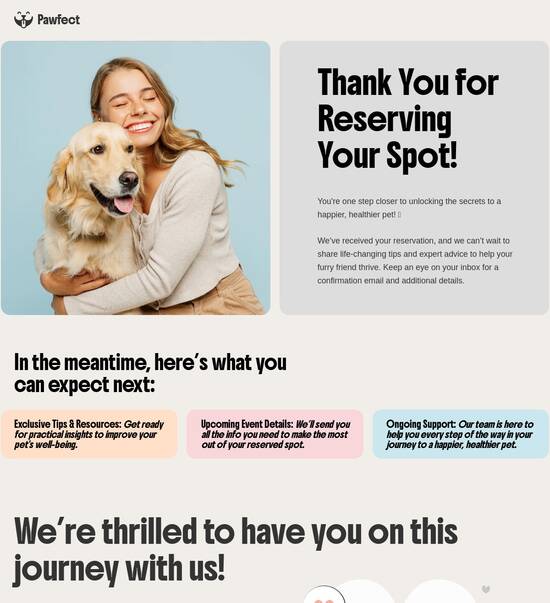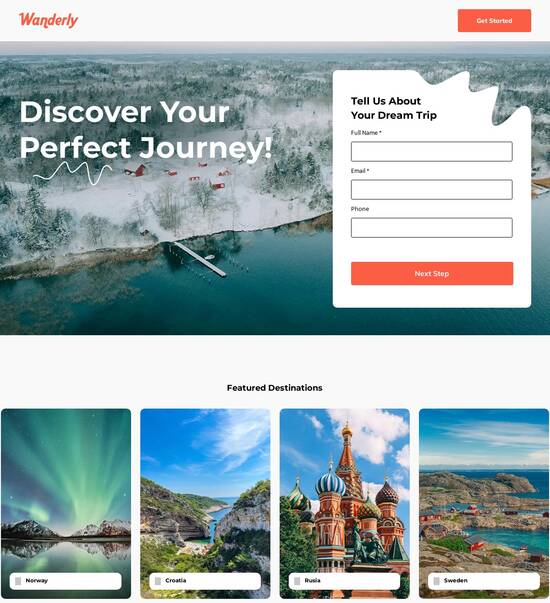
Pricing page template for Country managers
Explore Similar TemplatesAbout template
Master your online marketing with this builder for pricing page template for Country managers. Try more tools to create an immaculate landing page.
Recommended templates

Easy to build without coding
With the intuitive drag-and-drop builder, anyone on your team can create high-converting pages without any knowledge of code or design. Make enhancements to your landing page with custom widgets using Javascript, HTML/CSS, or third-party scripts.

Multiple layouts for any industry and goal
Select from 500+ landing page layouts built to boost conversions across industry-specific scenarios. Customize them by adjusting fonts, adding images, and generating on-brand content with the AI assistant. Quickly scale with Instablocks® and Global Blocks that you can save, reuse, and update globally.

Loads fast and looks polished on any device
Every template is responsive, which means they present professionally on any device and load blazingly fast with our Thor Render Engine. You can also power them up with Google AMP technology to deliver an unparalleled mobile experience and drive higher conversions.

Robust analytics & experimentation
Get real-time updates and reporting across all your devices, showing the number of visitors, conversions, cost-per-visitor, and cost-per-lead. Launch AI-powered experiments, run A/B tests, and use heatmaps to analyze user behavior, then optimize your landing page to maximize conversions.







Easy to build without coding
With the intuitive drag-and-drop builder, anyone on your team can create high-converting pages without any knowledge of code or design. Make enhancements to your landing page with custom widgets using Javascript, HTML/CSS, or third-party scripts.
Multiple layouts for any industry and goal
Select from 500+ landing page layouts built to boost conversions across industry-specific scenarios. Customize them by adjusting fonts, adding images, and generating on-brand content with the AI assistant. Quickly scale with Instablocks® and Global Blocks that you can save, reuse, and update globally.
Loads fast and looks polished on any device
Every template is responsive, which means they present professionally on any device and load blazingly fast with our Thor Render Engine.
Robust analytics & experimentation
Get real-time updates and reporting across all your devices, showing the number of visitors, conversions, cost-per-visitor, and cost-per-lead. Launch AI-powered experiments, run A/B tests, and use heatmaps to analyze user behavior, then optimize your landing page to maximize conversions.
All the features you need to build lead-generating landing pages
Explore more featuresLearn how to build top-performing landing pages for any goal
FAQs
Leading the way in building high-performing landing pages





Maximize ROI: The Ultimate Guide to Using the Pricing Page Template for Country Managers
The Pricing Page Template for Country Managers is a crucial asset in optimizing your marketing strategy, especially in diverse geographies. Instapage equips marketers with powerful tools to accelerate their campaigns and enhance conversion rates. This guide outlines the steps to effectively utilize this template, ensuring that your team's efforts translate into maximum return on investment.
Understanding the Importance of a Pricing Page Template
A well-structured pricing page is key to driving conversions and attracting the right audience. It serves as a vital point of decision for potential clients. With Instapage, marketers can leverage high-converting templates that cater specifically to regional nuances and consumer expectations.
- Enhances clarity: A focused pricing page outlines offers, removing ambiguity.
- Boosts trust: Transparent pricing builds credibility with potential customers.
- Increases engagement: Clear visuals and compelling content encourage user interaction.
Step 1: Choose the Right Template
Choosing the appropriate pricing page template is crucial for aligning with your marketing goals. Instapage provides over 100 high-converting templates. Consider the following when selecting a template:
- Market relevance: Ensure the template resonates with the local market's expectations.
- User experience: Select designs that enhance navigation and foster user engagement.
- Flexibility: Opt for customizable templates that allow modifications based on feedback.
Step 2: Optimize for Target Audience
Personalization is key in making your pricing page resonate with different audiences. Utilize Instapage’s personalization features to dynamically adapt your content:
- Dynamic text replacement: Tailor messages based on user segments.
- AdMaps: Align ads with dedicated landing pages for focused messaging.
- Audience metrics: Track performance data specific to each target segment.
Step 3: Monitor and Optimize Performance
After launching your pricing page, continuous monitoring is essential for improved results. Use built-in analytics and A/B testing features to refine your strategies:
- Experiment with different layouts and content to identify the most effective options.
- Analyze heatmaps to understand user behavior and engagement levels.
- Iterate based on data insights to constantly enhance conversion rates.
By following these steps, marketers can effectively utilize the pricing page template to cater to localized needs while ensuring higher conversions.
Ready to optimize your pricing strategy? Dive into Instapage today and harness the power of our templates for unparalleled marketing success.
People also ask about Pricing page template for Country managers
Pricing page template for country managers
The strategic framework of a country manager’s pricing page template
Pricing pages serve as a critical touchpoint for businesses seeking to tailor their offerings to diverse markets. As global expansion continues to be a focus for many organizations, country managers must craft pricing pages that reflect both local needs and competitive pressures. An effective pricing page not only conveys product value but also aligns with the economic landscape and cultural nuances of each specific country. This article outlines a comprehensive framework for creating impactful pricing pages that cater to the needs of country managers.
Understanding the role of pricing pages for country managers
The primary function of a pricing page is to communicate the value of products or services while justifying costs to customers. As country managers, it’s essential to define a clear pricing strategy that resonates with local audiences. This involves adapting to the regional economic factors such as income levels, purchasing power, and market demand. Understanding these aspects ensures that pricing is not only competitive but also reflective of the country-specific consumer behavior.
Leveraging data is crucial in driving pricing decisions. By utilizing market research, country managers can identify consumer preferences and sensitive pricing points. Additionally, analyzing competitor pricing frameworks helps formulate a distinct selling proposition. Monitoring these metrics allows for an agile response to market changes, ensuring that the pricing strategy remains relevant and effective.
Essential elements of a country-specific pricing page template
Creating a country-specific pricing page requires a careful approach to several essential elements. First and foremost is the importance of a dynamic currency display. This feature allows users to view prices in their local currency, enhancing the shopping experience. Multi-currency support not only accommodates local buyers but also cultivates trust in the brand. Tools that offer real-time currency conversion further cater to international customers, making the checkout process seamless.
Additionally, the layout and design of the pricing page play a significant role in user engagement. A user-friendly layout, with clear headings and minimal clutter, encourages visitors to explore options. Elements like colors, font choices, and imagery should align with brand guidelines while appealing to the target market. Furthermore, tailored pricing tiers and packages can be developed based on local demographics, allowing managers to cater to various segment needs. For instance, limited-time offers or bundling services may be particularly effective in markets with growing demand.
Enhancing user experience through simulation and interactive tools
To further enhance user experience, employing pricing simulators can be incredibly beneficial. These tools allow customers to see how different pricing options can affect their overall cost. For example, potential savings can be highlighted when users adjust quantities or select specific features. Engaging users with real-time adjustments not only informs them but also encourages interaction with the pricing page, thus promoting conversion rates.
Incorporating interactive comparison charts on the pricing page can also offer significant advantages. By allowing users to compare different pricing tiers side-by-side, they can better understand the value proposition of each package. This can be further tailored based on user profiles, ensuring that relevant comparisons are presented. These interactive tools not only elevate the overall experience but also guide users in making informed purchasing decisions.
Optimizing the pricing page for increased conversion rates
To maximize conversion rates, it's essential to incorporate A/B testing solutions into the pricing page strategy. Testing different pricing options, layouts, and messaging can help identify which elements resonate best with users. Insights gained from these experiments can guide data-driven decisions that optimize the pricing strategy. Statistically significant outcomes not only validate changes but can also reveal unexpected preferences among users, enabling continuous improvement.
Furthermore, crafting persuasive copy is vital for clearly communicating value. Techniques for creating compelling price descriptions range from highlighting unique features to emphasizing savings opportunities. The psychology behind pricing language, such as employing charm pricing strategies (e.g., $9.99 instead of $10), can influence consumer perceptions and purchasing behavior. Such nuanced approaches can significantly enhance the effectiveness of a pricing page.
Leveraging analytics for continuous improvement
Analytics play a crucial role in refining the pricing page's effectiveness. Tracking user behavior allows country managers to gauge engagement metrics such as bounce rates, average session duration, and conversion rates. By understanding these metrics, adjustments can be made that encourage longer visitor engagement and higher sales. Identifying patterns will also facilitate targeted modifications, addressing common user concerns or dropping points.
Additionally, establishing feedback loops through user experience surveys can provide valuable insights. Direct feedback about pricing can illuminate customer perceptions and reveal areas for improvement. Adapting the pricing strategy based on real-time feedback fosters an agile approach to market demands, ensuring that the pricing page remains relevant and effective over time.
Navigating local regulations and compliance in pricing models
Country managers must also navigate local regulations and compliance requirements in their pricing models. Every country might have different laws governing pricing, promotions, and consumer protections. Understanding these legal frameworks is crucial to avoid hefty penalties and reputational damage. Adapting to local taxation and duties is another significant aspect that can influence final pricing decisions. Ensuring compliance ensures that the business maintains a law-abiding and positive presence in the market.
Ethical pricing practices are equally important. Consumers today are increasingly empowered and discerning, thus transparency in pricing structures is paramount. Ensuring that pricing is not misleading and reflects the true value of the offer cultivates trust and loyalty among customers. Balancing profitability with consumer protection necessitates a thoughtful approach, one that aligns business objectives with ethical considerations.
Engaging students and educators with pricing knowledge
For those in marketing departments and educational settings, understanding pricing strategies is vital. Training interns and new staff on effective pricing strategies can bolster overall performance. Creating comprehensive educational materials and workshops based on best practices can empower new entrants to navigate complex pricing landscapes with confidence. Moreover, engaging students through pricing simulations and case studies can enhance their understanding of real-world applications.
Additionally, curating recommended textbooks and chapters focused on pricing and consumer behavior provides valuable resources for continuous learning. Highlighted chapters that delve into country-specific pricing strategies can foster deeper insights, preparing future marketers to make informed decisions as they enter the workforce.
Class levels and target audiences for pricing strategies
Differentiating pricing strategies by market tiers is another important consideration. Markets can be classified based on their maturity levels and consumer bases. For instance, emerging markets may require different pricing approaches compared to established markets. Crafting specific pricing strategies allows companies to tailor their offers and capture market share effectively. Understanding these nuances is crucial for positioning products accurately and avoiding misalignment with consumer expectations.
Strategies designed for emerging versus established markets can also shed light on the dynamics of pricing. For example, launching a product in a rapidly growing market might necessitate introductory offers, while established markets may emphasize premium positioning. Case studies illustrating successful adaptations provide real-world context for managers to draw from when developing their pricing approach.
Key facts and innovative approaches in pricing strategy
As pricing strategies evolve, understanding key trends shaping global practices becomes essential. Digital transformation is significantly influencing how businesses approach pricing adjustments. The proliferation of technology has altered consumer pricing expectations, leading to the demand for more flexible pricing structures. Staying abreast of these changes allows country managers to proactively adjust strategies and remain competitive.
Furthermore, noteworthy innovations in pricing tools present exciting opportunities for optimization. Exploring cutting-edge technologies that enhance pricing page design can lead to improved user experiences. Examples of brands successfully utilizing innovative pricing models underscore the importance of adopting forward-thinking strategies. These insights help craft more agile pricing comprehensive approaches that resonate across multiple markets.
Crafting a pathway for future innovations in pricing strategy
In closing this detailed overview, anticipating market changes and evolving consumer behavior is critical for shaping future pricing strategies. Preparing for shifts in economic landscapes, including recessions or growth spurts, can help ensure a resilient pricing model. Country managers should also explore various strategies for future-ready pricing adaptations that reflect these changes, thus positioning their businesses for sustained success.
Building a network of pricing experts fosters continuous improvement and innovation. Establishing connections with peers and thought leaders opens up dialogues around effective pricing strategies, providing fresh insights and perspectives. Engaging in these conversations can bolster knowledge and motivate teams to consistently find new and innovative approaches to pricing.
Ready to skyrocket conversions?
Supercharge your ad campaigns with high-performing landing pages
Get started














